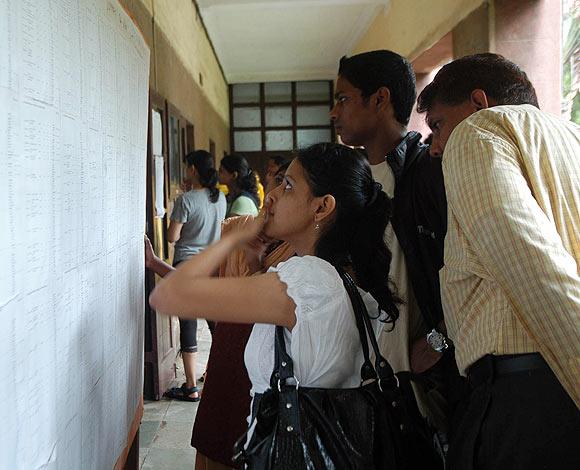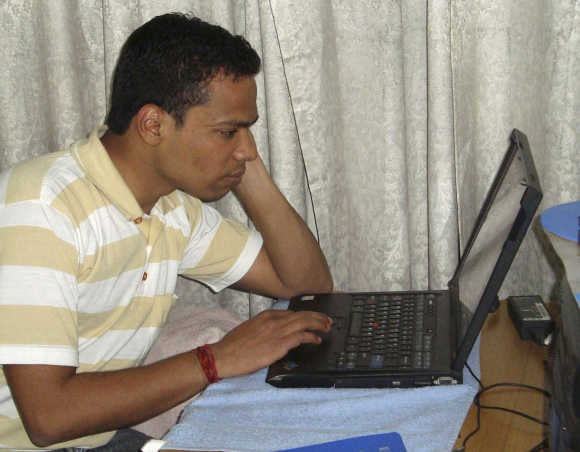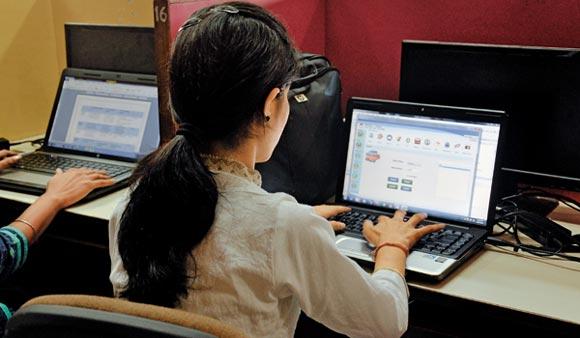 | « Back to article | Print this article |
Missed CAT 2013? 10 tips to make the most of GATE 2014
The dip in campus placements has resulted in increased registrations for the GATE 2014, making it more competitive.
The Graduate Admission Test in Engineering (GATE) is an all-India level exam for aspirants who are interested in pursuing Master's/direct PhD in India or abroad.
Over 12 lakh students applied for GATE 2013.
This indicates that if you want admission to top institutes like IIT, NIT and IISC, or a high paying job in Public Sector Undertakings (PSUs), you will need to work very hard!
Now this number may increase and GATE 2014 can see around 15 lakh applicants.
More candidates this year
Why does this number increase? When compared to last year, there has been a considerable dip in the placement figures.
Even institutes like IIT Bombay are facing the heat of global slowdown.
Companies have postponed joining dates for those hired on campus.
Beat the best!
If you are a student from an engineering college, which is rated average, this is a golden opportunity to level the playing field.
Unlike the CAT and b-school admissions, where your previous academic and non-academic performance matters along with work experience, GATE is based on scoring well in a single exam.
You can beat students from top engineering colleges like IITs/NITs.
It's not tough to crack GATE. But you need a commitment and dedication to give your best shot for preparation.
If you are aiming for GATE 2014, here are ten mantras for you to keep in mind.
Please click NEXT to continue reading...
10 tips to make the most of GATE 2014
1. Get familiar with the exam
Step one is to ensure that you have read all the information about the exam, its pattern, eligibility and syllabus.
If you are currently pursuing your qualifying degree or have recently completed it, you are already in touch with the study environment and concepts and topics.
Use this to your advantage.
10 tips to make the most of GATE 2014
2. Use good resources and books
Selection of the right books and material is very crucial.
Consult the faculty at your coaching institute or college, and buy previous year's question papers with solutions so that you have a proper understanding about the paper pattern.
Solve all previous year questions, thoroughly.
Since the GATE 2014 comes with the online pattern for the first time, you need to refer to the old pattern at the moment for previous year's analysis.
10 tips to make the most of GATE 2014
3. Plan your study well
The GATE covers the syllabus of roughly three to four years of engineering (considering the fact that subjects and concepts of the first year are part of the application).
So some subjects have a higher weightage than the others.
Analyse the focus area subjects as per your branch and the level of command you have on the subjects.
Keep the syllabus of GATE 2014 handy and plan your timetable as per the syllabus.
Keep in mind that even if a subject has lower weightage compared to others, it also contributes to the question paper.
4. Manage the syllabus and topics
Do not ignore some specific subjects completely, and leave them for the last minute, as you will be unable to cover them.
Be realistic when allocating time for each subject.
You need to cover each topic thoroughly as the syllabus is huge and questions can be from anywhere.
10 tips to make the most of GATE 2014
5. Make concise notes and be ready to revise study material
Always keep short notes of each chapter, which you can revise often.
It will help you in the last 30 days when revising directly from books would be difficult.
You may follow it the way you want -- underlining important details, highlighting key points, having a separate notebook for key information and formulae, making flash cards for formulae and key points, short forms or remembering details with the initials of a song or any other new way which makes you learn the topics well.
10 tips to make the most of GATE 2014
6. Test yourself frequently
Once you cover a topic or subject, refer to previous year's papers and check your level to know where you stand.
Don't refer to solutions after one failed attempt.
Attempt the question, two to three times before looking at the solution.
If you feel you are weak in some topics and can improve with revision, do proceed accordingly.
Prepare yourself in the best way for those tough three hours in the exam hall.
Click here to download previous year papers and sample papers, for free!
7. Take mock tests
Enrolling for a test series is a good mechanism to know where you stand.
You will know which areas need more attention.
If you have not yet enrolled for any test series with an institute, you can apply online or purchase a book/CD/DVD for self-practice.
Being honest in taking tests is very important.
Seek the support of your parents and siblings, to help create a peaceful environment at home while you take the test.
Analyse your performance in mock tests so that you understand the topics you were not able to attempt or those that consumed a lot of your time.
10 tips to make the most of GATE 2014
8. Complete the syllabus on time
Ensure that you complete your syllabus at least 45 days before the exam.
Ensure you revise all your topics in the first 30 days of this timeline.
Solve sample papers and appear in mock exams frequently in this period.
Avoid being in a situation where you miss some chapters or a subject completely.
Plan your studies accordingly and time it well.
In the last 15 days solve previous year's questions and attempt more mock papers.
9. Time management
Have you made timetables in the past?
Did you strictly follow them?
Sounds easy, but it's challenging.
Make a monthly plan on topics you will cover and when.
If you have joined some coaching institute, they will give you a schedule. You can plan as per that too.
If you haven't joined any classes, no need to panic. Make your own plan.
To ensure you are doing it right, discuss it with friends who have joined some coaching institute and compare the same.
Make a daily timetable.
Paste it on the wall exactly in front of your study table.
Now that you have made a timetable, ensure you follow it.
10. Reduce unnecessary activities
Postpone distractions like TV, Internet surfing, partying till the exam is over.
Of course, surfing for exam updates and exam–related activities is OK.






